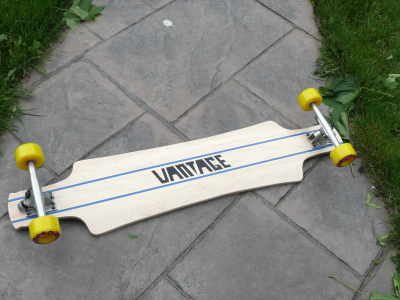Calvin Young had been longboarding on the streets of Sault Ste. Marie for about a year before deciding to build his own board, and now he’s looking at the sport from an entirely new vantage point.
Last summer, the 19-year-old Sault Ste. Marie resident founded his own longboard-manufacturing company, Vantage Boards, which has since produced more than a dozen custom boards for riders in the Sault, Edmonton and southern Ontario.
The University of Guelph student, who just completed the second year of a four-year biomedical engineering degree, was inspired after receiving a grant from the Summer Company program, which provides up to $3,000 in startup money for youth entrepreneurs, through Business Sault Ste. Marie, an arm of the Economic Development Corporation.
“There are always people looking for something specific, and you ride with people and talk with people about what they want and hear people say, ‘I’d like x and y in a board,’ and you don’t see boards with both of those things,” Young said. “I know there are a lot of people just getting into (longboarding), or looking for something not overly expensive, which I kind of offer too.”
What was once an obscure sport practised by thrill seekers on the West Coast, has exploded in popularity, as longboards—a type of skateboard used primarily for transportation or downhill racing—pop up on university campuses and in communities across the country. This year, the southern Ontario community of Picton will hold its third annual event sanctioned by the International Gravity Sports Association, the governing body for longboarding, and Young said a strong, supportive community is emerging for small builders.
From start to finish, Young does all the work himself, from his basement workshop with materials sourced from Ontario and Quebec. It takes about a week to complete one board, but Young estimated he could ramp up production to complete three boards a week if required.
“It starts as a pile of one-16th-inch of maple veneer and finishes as a skateboard,” he said. “I don’t do trucks or wheels—I order those—but the boards themselves are all produced by hand.”
While Young found valuable mentorship in his father and grandfather, a machinist and woodworker, respectively, he learned most of his skateboard-specific construction techniques from online research and through his contacts in the skateboarding industry. Unlike other manufacturing sectors, skateboard-building shops require a small production line, since there are only a few steps involved in making a board and much of the time is spent waiting for various glues, epoxies and paints to set, Young said.
The signature piece of equipment in Young’s shop is a hybrid vacuum and clamp press, which shapes the boards. After placing the wood plies over a mold, the board is put in a vacuum bag, the air is pulled out and the board is forced to take the shape of the mold.
Young’s boards start at $90 for a seven-ply wood deck, with the cost increasing with the incorporation of special materials like fibreglass, Texalium, carbon fibre or Kevlar. A ready-to-ride board, with trucks and wheels, starts at $200.
“It’s a little bit more expensive than some of the other starter options, but I also make sure that the boards are set up with good-quality trucks and wheels, which is a large part of the problem with some of the cheaper, mass-produced skateboards,” Young said. “You’ll get really bad-quality components on them and it makes you not want to ride. There’s a world of difference between a board set up with good equipment and a board set up with bad equipment.”
Because he’s simultaneously working towards his degree, Young currently only operates the business during the summer, but envisions the company continuing even after graduation. With the aim of applying his degree to the design of prosthetics, Young isn’t sure yet where his career may take him, but would welcome an opportunity to stay in the North.
In the meantime, he’s designing a complete lineup of boards for this year, and still plans to take on custom work. It’s a way to get riders what they need, while giving back to the skate community that’s helped him on his way.
“I quite like working with people so that they get what they want out of it,” Young said. “It’s a lot of fun to talk with someone and find out exactly what they want and go and build what they want as a rider.”




